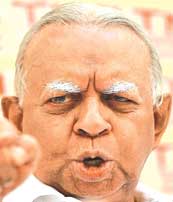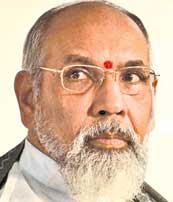TNA proposals based on 2015 Manifesto
Other minority parties busy drafting power-sharing
plans:
by P. Krishnaswamy
 |
 |
| R. Sampanthan |
C. V.
Wigneswaran |
The new constitution that is in the process of being drafted offers
new hopes of reconciliation, with the possibility of offering answers to
the Tamil ethnic issue that had plagued the island for 68 years of
post-independence.
Minority political parties are now zealously engaged in formulating
their proposals, to be submitted to the Constitutional Assembly for
consideration. Whether these proposals will contribute favourably
towards the making of the new constitution or complicate the process,
given the diversity of ideologies and political interests, is anybody's
guess.
The four-party Tamil National Alliance (TNA), the main opposition
with the largest minority representation, has stated that its proposals
will be based on the TNA election manifesto of August 2015 and others
before, all of which had been repeatedly endorsed by the Tamils of the
North and the East.
The repeated TNA position is that the "Tamil people are entitled to
the right of self-determination in keeping with the United Nations
International Covenants on Civil and Political Rights and Economic,
Social and Social Rights, both of which Sri Lanka has accepted and
acceded to."
TNA Leader R. Sampanthan and Party Spokesman M. A. Sumanthiran MP
told Colombo-based media recently that their proposals will be based on
maximum power devolution under a federal structure of governance, for
the unified North and East, within a united Sri Lanka.
Both Sampanthan and Sumanthiran left for Britain on January 25, to
study the federal system of governance prevailing in Scotland. In its
election manifesto, the party has also stated that: "Power sharing
arrangements must continue to be established as it existed earlier in a
unit of a merged Northern and Eastern Provinces based on a federal
structure.
The Tamil-speaking Muslim historical inhabitants shall be entitled to
be beneficiaries of all power-sharing arrangements in the North-East.
This will in no way inflict any disability on any people. Devolution
of power on the basis of shared sovereignty shall be over land, law and
order, enforcement of the law so as to ensure the safety and security of
the Tamil People, socio-economic development including health,
education, higher and vocational education, agriculture, fisheries,
industries, livestock development, cultural affairs, mustering of
resources, both domestic and foreign and fiscal powers ."
Alternative views
Leaders of the Tamil People's Council (TPC), spearheaded by Northern
Provincial Council Chief Minister and TNA dissident C. V. Wigneswaran
remained silent on the proposals currently being formulated by a party
sub-committee.
Some party sources on conditions of anonymity said that the proposals
are likely to be based on the 'Thimpu Principles," the main feature of
which would be the right of the Tamils for self-determination.
However, Wigneswaran at a recent meeting in Jaffna had said that
their stand was absolute self-autonomy without any interference from the
Center, insinuating that it was not unlikely that it will be based on
the Interim Self-Governance Authority (ISGA) proposal submitted by the
LTTE in October 2003 to the then administration.
Meanwhile, Leader of TNA constituent, Eelam People's Revolutionary
Front (EPRLF), Suresh Premachandran, said that proposals are being
formulated to be presented to the Constitutional Assembly next week and
will be released to the media thereafter.
Sri Lanka Muslim Congress (SLMC) Parliamentarian, M. H. M. Salman,
said that the committee appointed by the party is currently engaged in
formulating proposals which would be a deviation from party founder
leader M. H. M. Ashraff's declared policy of "maximum power devolution
under a unit of devolution consisting of all noncontiguous geographical
areas of domicile of the Muslims of the North and East" because much
water has flown under the bridge since then and that the ground
situation in the North and East, and the country as a whole, now being
totally different.
He said, proposals more appropriate to the current situation of
peace, mutual understanding and goodwill will be formulated.
He was, however, unable to give details because the proposal is now
in the process of being formulated. Ashraff announced the party policy
decision on the matter immediately after the Indo-Lanka Peace Agreement
of July 1987 that resulted in the 13th Amendment through which a
provincial council system was introduced for power sharing.
Leader of the National Congress (NC), A. L. M. Athaullah, said that
they would wait until the other two Muslim parties finalised their
proposals to make sure that all concerns of the Muslims have been
addressed. The National Congress would present its own separate
proposals only if there are serious shortcomings in the proposals of the
other two parties, Athaullah said. |

